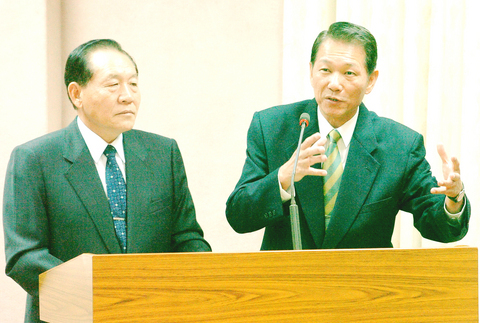Legislators from across party lines yesterday said the Ministry of National Defense's proposed budget for the purchase of eight diesel-electric submarines from the US was too high, with one lawmaker leaving the vice minister embarrassed after disputing figures the ministry provided.
"It makes no sense for the country to procure a diesel submarine at a price of two to 2.5 times that of a regular diesel submarine sold in the international arms market," Democratic Progressive Party (DPP) Legislator Lee Wen-chung (
US estimate

PHOTO: WANG MIN-WEI, TAIPEI TIMES
Vice Minister of National Defense Hou Shou-yeh (
Hou said that after including training and logistic costs, the purchase of weapons systems and factoring in estimated inflation, the ministry had proposed a budget of NT$288 billion (US$8.65 billion) for the eight submarines.
The figure works out to about US$1.08 billion per vessel.
Hou also provided examples of other countries' submarine procurement contracts and said that submarine costs fluctuate.
Hou said that Malaysia, India and Chile have all purchased French-built Scorpene class submarines, but because of differences ranging from the vessels' tonnage, power systems, weapons systems and when the contract was signed, their prices differed.
Hou added that according to Jane's Defence Weekly, while France had sold Chile Scorpene-class submarines for US$250 million it had charged India US$540 million each and Malaysia had paid US$580 million for the sub.
However, People First Party (PFP) Legislator Lin Yu-fang (
Details
Lin said regarding India, the ministry had quoted a Jane's Defence Weekly article that was published on Aug. 17, but the article also said the US$580 million price included a penalty fee that the two countries had agreed to negotiate on that the ministry had purposely failed to mention.
In addition, Lin said, according to the Sept. 23 edition of Jane's Navy International, France has agreed to waive the fee, so the submarine's price will be US$400 million.
Lin also said that under its contract with Malaysia, France sold the country two Scorpene-class submarines for US$580 million each, but had also offered an Agosta-class submarine for training for free.
Lin said that the ministry had purposely concealed the information to promote its proposed budget for the submarines.
An embarrassed Hou acknowledged that the ministry's data was outdated.
"The ministry made a mistake and it should have offered new data," he said.
The submarine procurement deal has long been stymied. The budget for the subs is included as part of the special arms budget bill, which has been blocked 30 times in the legislature.

The High Prosecutors’ Office yesterday withdrew an appeal against the acquittal of a former bank manager 22 years after his death, marking Taiwan’s first instance of prosecutors rendering posthumous justice to a wrongfully convicted defendant. Chu Ching-en (諸慶恩) — formerly a manager at the Taipei branch of BNP Paribas — was in 1999 accused by Weng Mao-chung (翁茂鍾), then-president of Chia Her Industrial Co, of forging a request for a fixed deposit of US$10 million by I-Hwa Industrial Co, a subsidiary of Chia Her, which was used as collateral. Chu was ruled not guilty in the first trial, but was found guilty

DEADLOCK: As the commission is unable to forum a quorum to review license renewal applications, the channel operators are not at fault and can air past their license date The National Communications Commission (NCC) yesterday said that the Public Television Service (PTS) and 36 other television and radio broadcasters could continue airing, despite the commission’s inability to meet a quorum to review their license renewal applications. The licenses of PTS and the other channels are set to expire between this month and June. The National Communications Commission Organization Act (國家通訊傳播委員會組織法) stipulates that the commission must meet the mandated quorum of four to hold a valid meeting. The seven-member commission currently has only three commissioners. “We have informed the channel operators of the progress we have made in reviewing their license renewal applications, and

‘DENIAL DEFENSE’: The US would increase its military presence with uncrewed ships, and submarines, while boosting defense in the Indo-Pacific, a Pete Hegseth memo said The US is reorienting its military strategy to focus primarily on deterring a potential Chinese invasion of Taiwan, a memo signed by US Secretary of Defense Pete Hegseth showed. The memo also called on Taiwan to increase its defense spending. The document, known as the “Interim National Defense Strategic Guidance,” was distributed this month and detailed the national defense plans of US President Donald Trump’s administration, an article in the Washington Post said on Saturday. It outlines how the US can prepare for a potential war with China and defend itself from threats in the “near abroad,” including Greenland and the Panama

Taiwan People’s Party (TPP) Chairman Huang Kuo-chang (黃國昌) yesterday appealed to the authorities to release former Taipei mayor Ko Wen-je (柯文哲) from pretrial detention amid conflicting reports about his health. The TPP at a news conference on Thursday said that Ko should be released to a hospital for treatment, adding that he has blood in his urine and had spells of pain and nausea followed by vomiting over the past three months. Hsieh Yen-yau (謝炎堯), a retired professor of internal medicine and Ko’s former teacher, said that Ko’s symptoms aligned with gallstones, kidney inflammation and potentially dangerous heart conditions. Ko, charged with